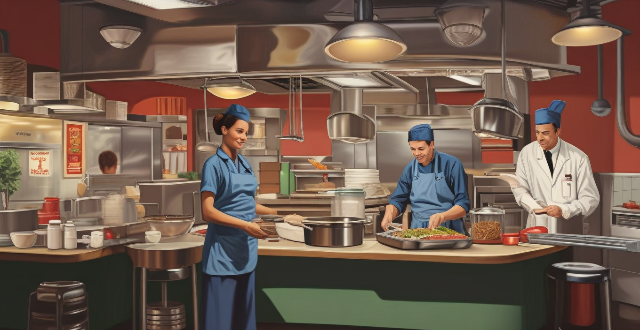Food safety is a critical aspect of the restaurant industry, involving handling, preparing, and storing food in ways that prevent contamination and foodborne illnesses. Restaurants can ensure food safety by following these steps: proper handling and storage, cooking and preparation techniques, maintaining cleanliness and sanitation, implementing food safety training and policies, and working with reliable suppliers and implementing quality control measures. By following these steps, restaurants can minimize the risk of foodborne illnesses and provide their customers with safe and delicious meals.

Ensuring Food Safety in Restaurants
Food safety is a critical aspect of the restaurant industry. It involves handling, preparing, and storing food in ways that prevent contamination and foodborne illnesses. Here are some steps restaurants can take to ensure the safety of their food:
1. Proper Handling and Storage
Proper handling and storage of food items are essential to maintain their quality and safety. Restaurants should:
* Store raw meat, poultry, and seafood separately from other foods.
* Keep cold foods at or below 40°F (4°C) and hot foods at or above 140°F (60°C).
* Use airtight containers for storage to prevent cross-contamination.
2. Cooking and Preparation
Cooking and preparation techniques play a crucial role in ensuring food safety. Restaurants should:
* Cook food thoroughly to the appropriate internal temperature.
* Avoid cross-contamination by using separate cutting boards and utensils for raw meat and ready-to-eat foods.
* Wash hands frequently during food preparation.
3. Cleanliness and Sanitation
Maintaining cleanliness and sanitation is vital for preventing the spread of harmful bacteria and viruses. Restaurants should:
* Clean and sanitize all surfaces, equipment, and utensils regularly.
* Train staff on proper cleaning and sanitizing procedures.
* Have a system in place for waste disposal and composting.
4. Food Safety Training and Policies
Implementing food safety training and policies is essential for maintaining a safe kitchen environment. Restaurants should:
* Provide regular food safety training to all employees.
* Develop and enforce strict food safety policies and procedures.
* Conduct regular inspections to ensure compliance with food safety regulations.
5. Supplier Relations and Quality Control
Working with reliable suppliers and implementing quality control measures can help ensure the safety and quality of ingredients used in food preparation. Restaurants should:
* Choose reputable suppliers who adhere to food safety standards.
* Inspect incoming deliveries for signs of spoilage or contamination.
* Implement a system for tracking ingredient sources and expiration dates.
In conclusion, ensuring food safety in restaurants requires attention to detail, proper training, and strict adherence to established protocols. By following these steps, restaurants can minimize the risk of foodborne illnesses and provide their customers with safe and delicious meals.